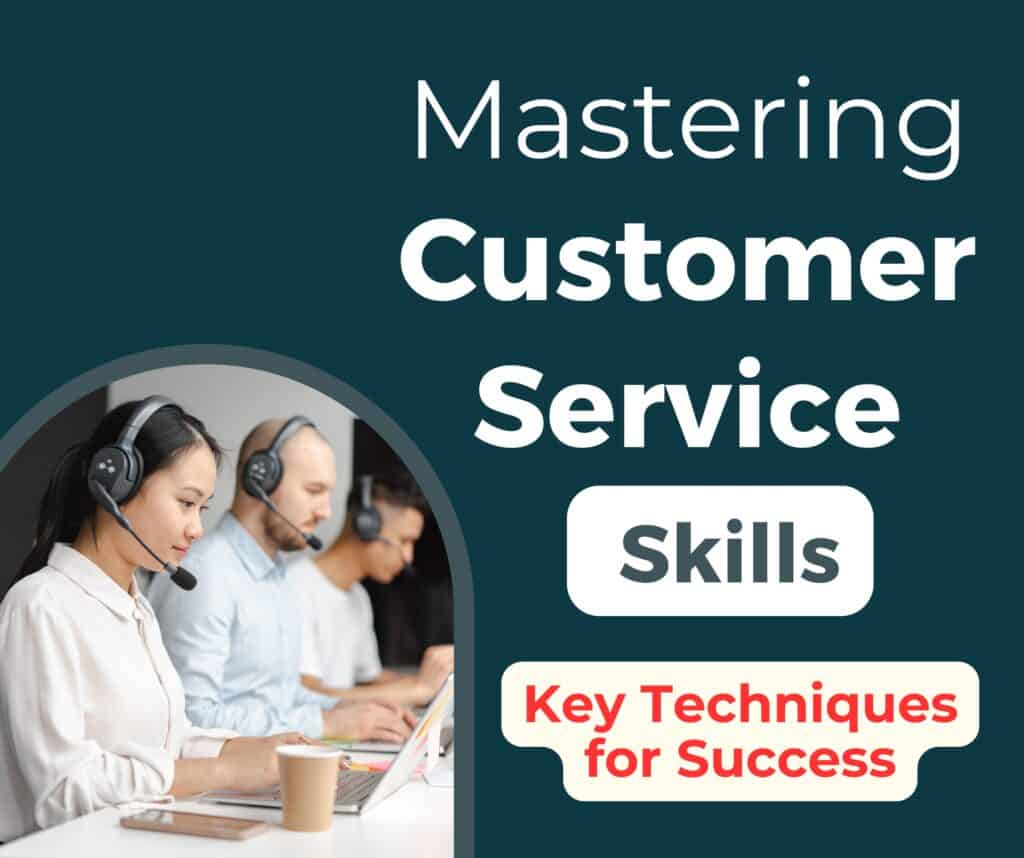In today’s competitive market, exceptional customer service is more critical than ever. Customer service skills are not just about resolving issues or answering questions; they are the cornerstone of a positive customer experience and play a pivotal role in shaping a company’s reputation. These skills encompass a range of abilities, including effective communication, problem-solving, empathy, and more, all aimed at meeting and exceeding customer expectations.
Brief Overview of the Importance of Customer Service Skills
Customer service skills are vital for creating meaningful interactions with customers. They help build rapport, establish trust, and foster long-term relationships. When employees excel in customer service, they are better equipped to address concerns promptly, offer tailored solutions, and make customers feel valued and heard. This not only enhances the customer’s experience but also reflects positively on the company’s brand.
Impact on Customer Satisfaction and Business Success
The impact of strong customer service skills on customer satisfaction is profound. When customers receive attentive, respectful, and effective service, they are more likely to be satisfied with their experience. High customer satisfaction often translates into increased loyalty, repeat business, and positive word-of-mouth referrals. Satisfied customers are more inclined to recommend the company to others, leading to new business opportunities and a stronger market position.
Conversely, poor customer service can have detrimental effects. Negative interactions can lead to dissatisfaction, loss of business, and damage to the company’s reputation. In the age of online reviews and social media, negative experiences can spread quickly and widely, potentially harming the business’s image and affecting its bottom line.
Ready to build your online brand? Start here!
Try Wealthy Affiliate (For Free).
Understanding the Basics of Customer Service
Definition of Customer Service
Customer service encompasses the support and assistance provided to customers before, during, and after a purchase or service interaction. It involves a range of activities designed to enhance the customer experience and ensure that their needs are met effectively. Customer service includes various forms of communication and support, such as answering inquiries, resolving problems, providing product information, and offering guidance on the use of products or services.
At its core, customer service is about creating a positive experience for customers. It involves understanding their needs, addressing their concerns, and ensuring they feel valued throughout their journey with the company. This support can be delivered through multiple channels, including in-person interactions, phone calls, emails, live chats, and social media platforms.
Importance of Effective Customer Service in Business
Effective customer service is crucial for several reasons:
- Customer Retention and Loyalty: High-quality customer service can significantly impact customer retention. When customers receive exceptional service, they are more likely to return for future purchases and remain loyal to the brand. Loyalty programs and repeat business often stem from positive service experiences.
- Positive Reputation and Brand Image: Companies known for excellent customer service build a strong and positive brand reputation. Satisfied customers are more likely to share their positive experiences with others, both online and offline, which enhances the company’s image and attracts new customers.
- Competitive Advantage: In competitive markets, superior customer service can differentiate a company from its competitors. Businesses that offer exceptional service stand out and can gain a competitive edge, as customers often prioritize service quality when choosing between brands.
- Customer Satisfaction and Experience: Effective customer service directly contributes to overall customer satisfaction. It ensures that customers’ needs are met promptly and effectively, leading to a more enjoyable experience. A positive customer experience often results in higher satisfaction scores and can influence customers’ perceptions and preferences.
- Increased Revenue and Business Growth: Satisfied customers are more likely to make repeat purchases and recommend the business to others, leading to increased sales and revenue. Good customer service can also reduce the cost of acquiring new customers, as word-of-mouth referrals often lead to new business opportunities.
- Resolution of Issues and Complaints: Effective customer service helps address and resolve issues or complaints efficiently. Prompt and courteous resolution of problems can turn a potentially negative experience into a positive one, thereby preventing customer churn and enhancing satisfaction.
Essential Customer Service Skills
In the realm of customer service, certain skills are fundamental to providing excellent support and creating positive customer experiences. Mastery of these skills can significantly impact the quality of interactions and the overall success of customer service efforts.
Communication Skills
Clear and Concise Communication
Effective communication is the cornerstone of great customer service. Clear and concise communication ensures that customers understand the information being conveyed and reduces the likelihood of misunderstandings. Service representatives should be able to explain details without using jargon or overly complex language. This involves breaking down information into manageable parts and presenting it in a straightforward manner.
Active Listening Techniques
Active listening is crucial for understanding customer needs and concerns. It involves giving full attention to the speaker, acknowledging their points, and responding thoughtfully. Techniques for active listening include nodding, paraphrasing what the customer has said, and asking clarifying questions. This demonstrates empathy and ensures that the representative fully comprehends the issue at hand before providing a solution.
Positive and Professional Language
Using positive and professional language helps to create a pleasant and respectful interaction. Avoiding negative or confrontational phrases and instead focusing on solutions and opportunities can help to de-escalate tense situations. Professionalism also involves maintaining a courteous tone and avoiding slang or overly casual language, which can impact the perceived respectfulness of the interaction.
Problem-Solving Skills
Identifying Customer Issues Quickly
The ability to identify and understand customer issues promptly is key to providing effective solutions. This involves actively listening to the customer’s problem, asking relevant questions, and diagnosing the issue accurately. Quick identification helps in addressing the problem more efficiently and reducing the customer’s frustration.
Offering Practical Solutions
Once the issue is identified, offering practical and actionable solutions is essential. Representatives should aim to resolve the problem in a way that meets the customer’s needs while adhering to company policies. Practical solutions are those that are feasible and can be implemented effectively to address the customer’s concerns.
Following Up to Ensure Resolution
After providing a solution, following up with the customer to ensure that the issue has been resolved satisfactorily is crucial. This involves checking in with the customer to confirm that the solution was effective and that they are satisfied with the outcome. Following up demonstrates commitment to customer satisfaction and helps in building trust and rapport.
Affiliate Notice: This post includes affiliate links, which means I may earn a commission if you make a purchase. These links provide access to valuable resources like free training and tools for your online success.
Try Wealthy Affiliate (For Free).
Empathy and Emotional Intelligence
Understanding and Relating to Customer Emotions
Empathy involves understanding and sharing the feelings of the customer. Recognizing their emotions and responding with compassion helps to build a connection and demonstrates that their concerns are taken seriously. Emotional intelligence allows representatives to navigate emotional conversations effectively and provide support that aligns with the customer’s emotional state.
Building Rapport and Trust
Building rapport and trust with customers involves creating a positive relationship through genuine interactions and reliability. Establishing common ground, showing respect, and demonstrating a commitment to meeting the customer’s needs helps in fostering trust. Rapport-building can enhance the overall customer experience and lead to stronger customer relationships.
Handling Difficult Situations with Sensitivity
Handling difficult or sensitive situations with care requires a high level of emotional intelligence and empathy. Representatives should remain calm, listen actively, and respond thoughtfully to de-escalate the situation. Sensitivity involves acknowledging the customer’s feelings and addressing their concerns with respect and understanding.
Patience and Adaptability
Remaining Calm Under Pressure
Patience is essential when dealing with challenging or high-pressure situations. Representatives should remain calm and composed, even when faced with frustrated or irate customers. Maintaining a steady demeanor helps in managing the interaction effectively and prevents the escalation of the situation.
Adapting to Different Customer Personalities and Situations
Adaptability involves adjusting one’s approach based on the customer’s personality and the specific context of the interaction. Different customers may have varying preferences and communication styles, and being flexible in approach helps in meeting their needs more effectively. Adapting to different situations ensures that service remains relevant and effective across diverse scenarios.
Product and Service Knowledge
Knowing Your Offerings Thoroughly
A deep understanding of the company’s products and services is crucial for providing accurate and helpful support. Representatives should be well-versed in the features, benefits, and limitations of the offerings to answer questions confidently and provide informed recommendations.
Providing Accurate and Helpful Information
Providing accurate and relevant information helps in addressing customer inquiries and concerns effectively. It involves using up-to-date knowledge and resources to ensure that the information given is reliable and beneficial. Accurate information contributes to a positive customer experience and helps in building trust with the customer
Developing and Improving Customer Service Skills
Developing and continually improving customer service skills is essential for maintaining high standards of customer interaction and ensuring ongoing business success. This section explores key methods for enhancing these skills, including training opportunities, feedback mechanisms, and practical exercises.
Training and Professional Development Opportunities
Structured Training Programs
Structured training programs provide a comprehensive foundation in customer service skills. These programs often include workshops, seminars, and courses designed to teach essential skills such as communication, problem-solving, and empathy. Training programs can be offered internally by the company or externally by professional organizations and institutions. They often include modules on best practices, customer service standards, and industry-specific techniques.
Online Courses and E-Learning
With the rise of digital learning, online courses and e-learning platforms offer flexible and accessible training options. These courses cover a wide range of customer service topics and allow employees to learn at their own pace. Many platforms provide interactive content, quizzes, and video tutorials to enhance learning. E-learning can be particularly beneficial for remote teams or for those who need to balance training with other responsibilities.
Certifications and Professional Credentials
Certifications in customer service or related fields can bolster employees’ skills and enhance their credentials. Professional certifications, such as those offered by organizations like the International Customer Service Association (ICSA) or the Customer Service Institute, validate expertise and commitment to high service standards. Earning such credentials can also motivate employees to engage more deeply with their professional development.
Seeking Feedback and Learning from Customer Interactions
Collecting Customer Feedback
Regularly collecting feedback from customers provides valuable insights into the effectiveness of customer service interactions. This feedback can be gathered through surveys, feedback forms, or direct communication. Analyzing customer feedback helps identify strengths and areas for improvement, allowing representatives to understand how their service is perceived and where adjustments may be needed.
Internal Feedback Mechanisms
In addition to customer feedback, internal feedback mechanisms can help employees improve their skills. This includes regular performance reviews, one-on-one meetings with supervisors, and peer evaluations. Constructive feedback from colleagues and managers provides actionable insights into areas for improvement and helps in setting goals for skill development.
Learning from Customer Interactions
Each customer interaction is an opportunity for learning. Reflecting on past interactions, particularly challenging or complex ones, allows representatives to assess what went well and what could be improved. Reviewing recorded interactions, when available, can provide a detailed analysis of communication styles, problem-solving approaches, and overall effectiveness.
Role-Playing and Simulation Exercises
Role-Playing Scenarios
Role-playing exercises simulate real-life customer interactions and allow employees to practice their skills in a controlled environment. By taking on different roles, such as a customer with a complaint or a customer seeking product information, employees can practice their responses and refine their approach. Role-playing helps build confidence, improves problem-solving skills, and enhances the ability to handle various scenarios effectively.
Simulation Exercises
Simulation exercises involve creating realistic scenarios that employees might encounter in their daily work. These exercises often use technology, such as customer service simulations or virtual reality, to mimic real customer interactions. Simulations provide hands-on experience and allow employees to practice their skills in a dynamic and interactive setting. They can also help in identifying areas of strength and areas needing improvement.
Feedback and Reflection
After role-playing and simulation exercises, it is important to debrief and reflect on the experience. Feedback sessions with trainers or peers can provide insights into performance, highlight effective strategies, and identify areas for growth. Reflection helps in consolidating learning, understanding the impact of different approaches, and making improvements for future interactions.
Continuous Improvement
Developing and improving customer service skills is an ongoing process. Regularly engaging in training, seeking feedback, and participating in practical exercises ensures that employees remain adept at handling various customer interactions and adapting to evolving customer needs. By committing to continuous improvement, companies can enhance the quality of their customer service and maintain a competitive edge
Measuring the Effectiveness of Customer Service Skills
Measuring the effectiveness of customer service skills is crucial for ensuring that interactions meet quality standards and contribute to overall business success. By evaluating various metrics and feedback sources, organizations can assess how well their customer service strategies are working and identify areas for improvement. This section explores key methods for measuring customer service effectiveness, including key performance indicators (KPIs), customer satisfaction surveys, and feedback analysis.
Key Performance Indicators (KPIs) for Customer Service
Customer Satisfaction Score (CSAT)
The Customer Satisfaction Score (CSAT) is a widely used KPI that measures how satisfied customers are with a specific interaction or overall experience. Typically obtained through post-interaction surveys, CSAT scores are often expressed as a percentage or on a scale of 1 to 10. Higher scores indicate higher levels of satisfaction, while lower scores highlight areas needing improvement. CSAT provides immediate insights into how well customer service representatives are performing.
Launch your online career today. Click below!
Try Wealthy Affiliate (For Free).
Net Promoter Score (NPS)
Net Promoter Score (NPS) gauges customer loyalty by asking customers how likely they are to recommend the company to others. The NPS is calculated by subtracting the percentage of detractors (customers who rate 0-6) from the percentage of promoters (customers who rate 9-10). A higher NPS indicates stronger customer loyalty and satisfaction, while a lower NPS suggests potential issues with service quality or customer experience.
First Contact Resolution (FCR)
First Contact Resolution (FCR) measures the percentage of customer issues resolved on the first interaction, without the need for follow-up. High FCR rates are indicative of effective problem-solving and efficient service. This KPI helps assess whether representatives are addressing customer concerns adequately and promptly during the initial contact.
Average Handle Time (AHT)
Average Handle Time (AHT) tracks the average duration of customer interactions, including talk time and follow-up activities. While a shorter AHT can suggest efficiency, it is important to balance this with the quality of service provided. Excessively short handle times may indicate rushed interactions, while longer times could point to complex issues or inefficiencies.
Customer Effort Score (CES)
Customer Effort Score (CES) measures how easy it is for customers to resolve their issues or get their questions answered. Typically obtained through surveys asking customers to rate the effort required to achieve their goal, CES helps identify friction points in the customer service process. Lower effort scores indicate smoother, more efficient interactions.
Customer Satisfaction Surveys
Designing Effective Surveys
Customer satisfaction surveys are a vital tool for gathering direct feedback from customers about their service experience. Designing effective surveys involves asking clear, relevant questions that provide actionable insights. Common survey questions include rating satisfaction with specific aspects of the service, such as responsiveness, helpfulness, and professionalism. Ensuring that surveys are concise and easy to complete helps improve response rates and data quality.
Timing and Frequency of Surveys
Timing and frequency are important considerations when conducting customer satisfaction surveys. Surveys should be sent promptly after an interaction or transaction to capture accurate feedback while the experience is still fresh in the customer’s mind. Depending on the context, surveys can be conducted after individual interactions, periodically, or after major milestones.
Interpreting Survey Results
Analyzing survey results provides valuable insights into customer perceptions and satisfaction levels. Key areas to evaluate include overall satisfaction scores, specific feedback on service aspects, and trends over time. Identifying recurring themes or issues can help pinpoint areas for improvement and guide efforts to enhance the customer experience.
Analyzing Feedback and Making Improvements
Collecting and Aggregating Feedback
Beyond surveys, collecting feedback from various sources, such as direct customer comments, social media interactions, and complaint logs, provides a comprehensive view of customer sentiments. Aggregating feedback helps identify common issues, emerging trends, and areas where service delivery can be improved.
Identifying Trends and Patterns
Analyzing feedback involves identifying patterns and trends that reveal insights into service performance. For example, frequent mentions of long wait times or recurring issues with a particular process can indicate underlying problems that need addressing. Understanding these trends helps in developing targeted strategies for improvement.
Implementing Changes and Monitoring Impact
Once areas for improvement are identified, implementing changes based on feedback is essential. This may involve adjusting service processes, enhancing training programs, or introducing new tools and technologies. After implementing changes, monitoring the impact on customer satisfaction and service quality helps assess the effectiveness of the modifications and ensure ongoing improvement.
Continuous Improvement Process
Measuring the effectiveness of customer service skills is not a one-time task but an ongoing process. Regularly reviewing KPIs, analyzing feedback, and making necessary adjustments ensures that customer service remains aligned with customer expectations and business objectives. A commitment to continuous improvement helps maintain high standards of service and fosters a positive customer experience
Conclusion
In today’s highly competitive market, the significance of strong customer service skills cannot be overstated. These skills are integral to delivering exceptional customer experiences, which in turn, drive business success and growth. Let’s recap why mastering customer service skills is essential and how ongoing development can make a difference.
Recap of the Importance of Strong Customer Service Skills
Strong customer service skills are foundational to creating positive interactions with customers. These skills encompass effective communication, problem-solving, empathy, and adaptability. Mastery in these areas ensures that customer needs are met efficiently and satisfactorily. High-quality customer service not only resolves issues but also enhances customer loyalty, builds trust, and fosters long-term relationships. It reflects the company’s commitment to excellence and significantly impacts overall customer satisfaction.
Ready to earn money online? Click to begin
Try Wealthy Affiliate (For Free).
Effective customer service skills help companies stand out in a crowded marketplace. By delivering personalized, respectful, and responsive service, businesses can differentiate themselves from competitors and cultivate a loyal customer base. Positive customer interactions often lead to repeat business, favorable reviews, and referrals, all of which contribute to a stronger brand reputation and increased revenue.
Encouragement to Continuously Develop and Refine These Skills
Developing and refining customer service skills is a continuous journey. The dynamics of customer expectations and the business environment are always evolving, making it essential for customer service professionals to stay up-to-date with best practices and emerging trends. Regular training, seeking feedback, and engaging in practical exercises are crucial for maintaining and enhancing these skills.
Investing in ongoing professional development helps customer service representatives stay adept at handling various situations and adapting to new challenges. It fosters a culture of learning and improvement within the organization, leading to better service outcomes and higher employee satisfaction. Continuous skill enhancement not only benefits individual performance but also contributes to the overall success of the company.
Final Thoughts on the Impact of Excellent Customer Service on Business Growth
Excellent customer service has a profound impact on business growth and success. When customers receive exceptional service, they are more likely to remain loyal, make repeat purchases, and advocate for the brand. This loyalty translates into sustained revenue and a competitive advantage in the market. Additionally, positive customer experiences can lead to valuable word-of-mouth referrals, further expanding the customer base and driving growth.
In contrast, poor customer service can have detrimental effects, including lost business, damaged reputation, and increased churn rates. The cost of addressing customer complaints and recovering from negative experiences can be significant. Therefore, prioritizing and excelling in customer service is not just a strategy for customer satisfaction but a critical component of business success.
In conclusion, investing in strong customer service skills and committing to continuous improvement is essential for any organization aiming for growth and success. By delivering outstanding service, businesses can build lasting customer relationships, enhance their reputation, and achieve long-term success.
We’d love to hear from you! Share your experiences with customer service in the comments below—whether you’ve had exceptional service, faced challenges, or have tips to improve customer interactions. If you have any questions or need further insights on developing customer service skills, feel free to ask. Your feedback and queries help us provide more valuable content and foster a community of learning and improvement. Join the conversation and let’s continue to enhance our customer service practices together!








I have been surfing online more than 3 hours today yet I never found any interesting article like yours It is pretty worth enough for me In my opinion if all web owners and bloggers made good content as you did the web will be much more useful than ever before